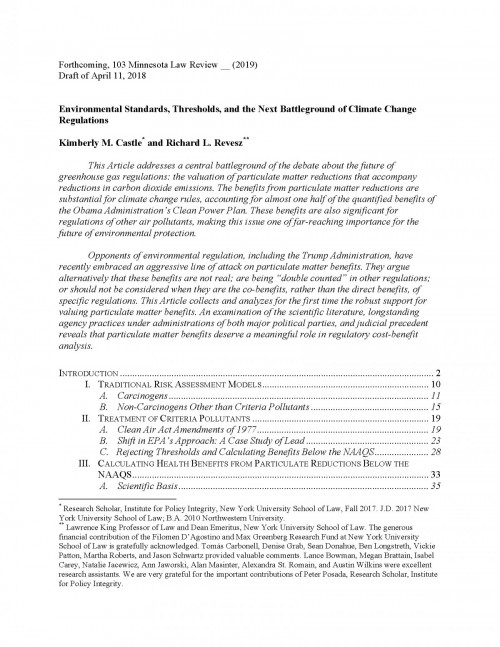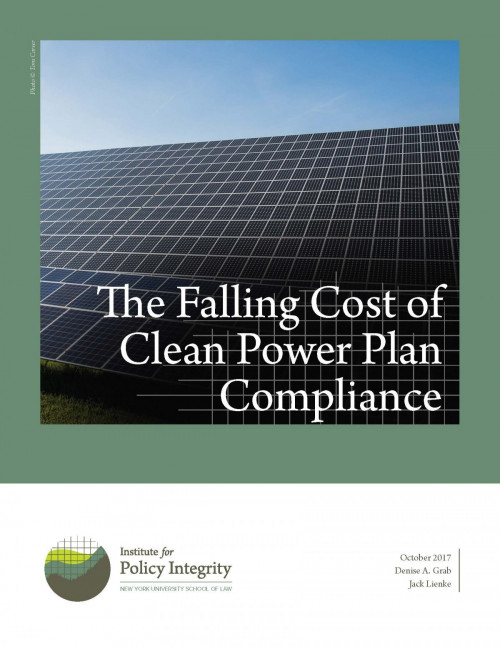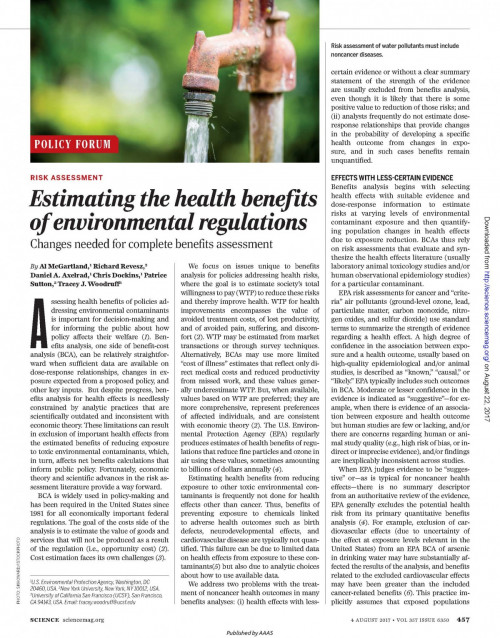-
Comments to EPA on Coal Combustion Residuals Rule
In 2015, the United States Environmental Protection Agency (EPA) established minimum criteria for the safe disposal of coal combustion residuals. At the time, EPA projected that the new rule would yield substantial health and environmental benefits. EPA now proposes to weaken the requirements of the 2015 rule but insists that doing so “will not change risks to human health and the environment” and thus will have no effect on the projected benefits of the 2015 rule. Our comments explain why EPA cannot reasonably assume that its proposed changes will have no effect on the 2015 rule’s projected benefits.
-

Environmental Standards, Thresholds, and the Next Battleground of Climate Change Regulations
Regulations to curtail climate change have the additional benefit of reducing air pollution by accelerating the shift away from carbon-intensive and high-polluting energy such as coal. The benefits from reducing just one air pollutant – particulate matter – account for almost half of the quantified benefits of the Obama Administration’s Clean Power Plan. Regulatory opponents have launched an aggressive attack on the use of these benefits to justify climate change regulations. They claim that these benefits are not real, are accounted for in other regulations, or should not be considered because they are indirect benefits. This article, published in the Minnesota Law Review, collects and analyzes for the first time the robust support for valuing particulate matter and other air pollution reduction benefits. Following an examination of the scientific literature, longstanding agency practices under administrations of both major political parties, and judicial precedent, the authors conclude that particulate matter benefits deserve a meaningful role in regulatory cost-benefit analysis.
-
Comments on Regulatory Impacts Draft Report to Congress
The Office of Management and Budget’s (OMB’s) annual reports to Congress not only compile all the significant benefits and costs of federal regulations, but they also offer federal agencies and academics an up-to-date summary of the literature on key practices in regulatory impact analysis. As such, OMB’s annual reports should reflect the most comprehensive syntheses of the legal and economic literature on these analytical practices. Our comments on OMB’s draft report for 2017 propose two additions to its summaries of the literature on job impact analysis and on co-benefits analysis
-
Comments to EPA on Grandfathering and Glider Trucks
The Environmental Protection Agency (EPA) has proposed to grandfather glider trucks, which have new truck bodies but old powertrains, into older emissions requirements. Our comments to EPA argue that the Agency improperly disregarded the effects that this exemption would have on air pollution, public health, and environmental quality, in violation of both the Clean Air Act and applicable executive orders on cost-benefit analysis. In particular, EPA failed to consider the extent to which its action will increase air pollution (and attendant environmental harms) by extending the useful economic life of older, dirtier powertrains.
-
Brief on EPA Chemical Disaster Rule Delay
EPA recently delayed the effective date of a rule that would have decreased the severity and number of chemical accidents at manufacturing facilities and refineries. State and NGO plaintiffs sued EPA over the delay, arguing that EPA did not have statutory authority to issue it, and that the delay was arbitrary and capricious. We filed a brief in support of petitioners arguing that EPA did not offer an adequate explanation for choosing to forgo the benefits of the chemical disaster rule.
-
Comments on Reconsideration of NHTSA Rule to Update Civil Penalties
In December 2016, the National Highway Traffic Safety Administration (NHTSA) finalized a rule that updates civil penalties for car manufacturers that violate fuel economy standards. NHTSA is now reconsidering the rule, claiming it would have a significant negative economic impact. The agency provides no evidence that economic circumstances have changed since the rule’s finalization to make the rule more costly. Our comments argue that the agency should not proceed with the proposed reconsideration, because it inadequately explained why it changed positions. If the agency does continue with the reconsideration, both the Inflation Adjustment Act and economic cost-benefit analysis would justify an update to the penalties rates rather than maintaining the original penalty rate from 1975.
-

The Falling Cost of Clean Power Plan Compliance
In 2015, the U.S. Environmental Protection Agency (EPA) released the Clean Power Plan, a Clean Air Act rule designed to address the threat of climate change by cutting carbon dioxide emissions from fossil fuel-fired power plants. As part of that rulemaking, the agency prepared an estimate of compliance costs, which it found would be far outweighed by the rule’s climate and health benefits. Since that time, changes in the electric sector have made it even cheaper to meet the rule’s emission targets than EPA anticipated. This report summarizes the findings of EPA’s 2015 Regulatory Impact Analysis; discusses subsequent market and policy developments that have lowered the cost of complying with the Clean Power Plan; and surveys more recent analyses by independent groups, which have estimated substantially lower compliance costs than EPA did.
-
Comments to OSHA on Beryllium Standards Revocation
In public comments to the Occupational Safety and Health Administration, we highlight some critical problems with the agency’s cost-benefit analysis in its proposed revocation of standards to protect workers from exposure to beryllium. These ancillary standards were designed to protect workers in the construction and shipyard sectors.
-
Comments to EPA on Delaying Methane Rule
In 2016, EPA issued a rule to decrease methane and volatile organic compound emissions from new, modified, and reconstructed sources in the oil and natural gas sector. EPA has now proposed to suspend some of the rule’s compliance obligations for two years while the agency decides whether and how to revise those requirements. The U.S. Court of Appeals for the D.C. Circuit rejected an earlier attempt by EPA to stay the methane rule for 90 days, and our comments argue that the new proposal is similarly unlawful.
-

Estimating the Health Benefits of Environmental Regulations
Regulating toxic pollutants benefits society by limiting public exposure to harmful pollution. By accurately quantifying these benefits, policymakers can improve the design of regulations that protect public health and better communicate the magnitude of these protections to the public. A new article in the journal Science examines how this process can be improved.
Viewing recent projects in Environmental Health


